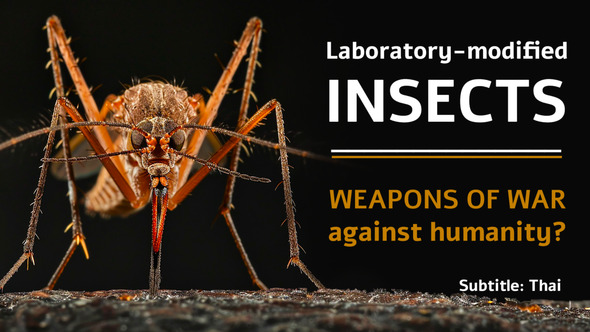All Videos (ภาษาไทย)
Insects modified in the laboratory – weapons of war against humanity?
11.07.2024
Subtitle "Afrikaans" was produced by machine.Subtitle "አማርኛ" was produced by machine.Subtitle "العربية " was produced by machine.Subtitle "Ārāmāyâ" was produced by machine.Subtitle "azərbaycan dili " was produced by machine.Subtitle "беларуская мова " was produced by machine.Подзаглавието "България" е създадено от машина.সাবটাইটেল "বাংলা " মেশিন দ্বারা তৈরি করা হয়েছিল।Subtitle "བོད་ཡིག" was produced by machine.Subtitle "босански" was produced by machine.Subtitle "català" was produced by machine.Subtitle "Cebuano" was produced by machine.Subtitle "ગુજરાતી" was produced by machine.Subtitle "corsu" was produced by machine.Podtitul "Čeština" byl vytvořen automaticky.Subtitle "Cymraeg" was produced by machine.Subtitle "Dansk" was produced by machine.Untertitel "Deutsch" wurde maschinell erzeugt.Subtitle "Untertitel" was produced by machine.Ο υπότιτλος "Ελληνικά" δημιουργήθηκε αυτόματα.Subtitle "English" was produced by machine.Subtitle "Esperanto" was produced by machine.El subtítulo "Español" se generó automáticamente.Subtitle "Eesti" was produced by machine.Subtitle "euskara" was produced by machine.Subtitle "فارسی" was produced by machine.Subtitle "Suomi" was produced by machine.Le sous-titrage "Français" a été généré automatiquement.Subtitle "Frysk" was produced by machine.Subtitle "Gaeilge" was produced by machine.Subtitle "Gàidhlig" was produced by machine.Subtitle "Galego" was produced by machine.Subtitle "Schwizerdütsch" was produced by machine.Subtitle "هَوُسَ" was produced by machine.Subtitle "Ōlelo Hawaiʻi" was produced by machine.Subtitle "עברית" was produced by machine.Subtitle "हिन्दी" was produced by machine.Subtitle "Mẹo" was produced by machine.Podnaslov "Hrvatski" generiran je automatski.Subtitle "Kreyòl ayisyen " was produced by machine.Subtitle "Magyar" was produced by machine.Subtitle "Հայերեն" was produced by machine.Subtitle "Bahasa Indonesia " was produced by machine.Subtitle "Asụsụ Igbo " was produced by machine.Textun"Íslenska" var framkvæmt vélrænt.Sottotitoli "Italiano" sono stati generati con l'intelligenza artificiale.字幕は"日本語" 自動的に生成されました。Subtitle "Basa Jawa" was produced by machine.Subtitle "ქართული" was produced by machine.Subtitle "қазақ тілі " was produced by machine.Subtitle "ភាសាខ្មែរ" was produced by machine.Subtitle "ಕನ್ನಡ" was produced by machine.Subtitle "한국어" was produced by machine.Subtitle "कोंकणी語" was produced by machine.Subtitle "کوردی" was produced by machine.Subtitle "Кыргызча" was produced by machine.Subtitle " lingua latina" was produced by machine.Subtitle "Lëtzebuergesch" was produced by machine.Subtitle "Lingala" was produced by machine.Subtitle "ພາສາ" was produced by machine.Antraštė "Lietuvių" buvo sukurta mašina.Subtitle "Latviešu" was produced by machine.Subtitle "fiteny malagasy" was produced by machine.Subtitle "te reo Māori" was produced by machine.Subtitle "македонски јазик" was produced by machine.Subtitle "malayāḷaṁ" was produced by machine.Subtitle "Монгол хэл" was produced by machine.Subtitle "मराठी" was produced by machine.Subtitle "Bahasa Malaysia" was produced by machine.Subtitle "Malti" was produced by machine.Subtitle "မြန်မာစာ " was produced by machine.Subtitle "नेपाली" was produced by machine.Ondertitels "Nederlands" machinaal geproduceerd.Subtitle "Norsk" was produced by machine.Subtitle "chiCheŵa" was produced by machine.Subtitle "ਪੰਜਾਬੀ" was produced by machine.Podtytuł "Polska" został utworzony przez maszynę.Subtitle "پښتو" was produced by machine.Legenda "Português" foi gerada automaticamente.Subtitle "Română" was produced by machine.Subtitle "Язык жестов (Русский)" was produced by machine.Субтитры "Pусский" были созданы машиной.Subtitle "Kinyarwanda" was produced by machine.Subtitle "सिन्धी" was produced by machine.Subtitle "Deutschschweizer Gebärdensprache" was produced by machine.Subtitle "සිංහල" was produced by machine.Subtitle "Slovensky" was produced by machine.Subtitle "Slovenski" was produced by machine.Subtitle "gagana fa'a Samoa" was produced by machine.Subtitle "chiShona" was produced by machine.Subtitle "Soomaaliga" was produced by machine.Titra "Shqip" u krijua automatikisht.Превод "србски" је урађен машински.Subtitle "Sesotho" was produced by machine.Subtitle "Basa Sunda" was produced by machine.Undertext "Svenska" är maskinell skapad.Subtitle "Kiswahili" was produced by machine.Subtitle "தமிழ்" was produced by machine.Subtitle "తెలుగు" was produced by machine.Subtitle "Тоҷикй" was produced by machine.Subtitle "ภาษาไทย" was produced by machine.ንኡስ ኣርእስቲ "ትግርኛ" ብማሽን እዩ ተፈሪዩ።Subtitle "Türkmençe" was produced by machine.Subtitle "Tagalog" ay nabuo sa pamamagitan ng makina.Altyazı "Türkçe" otomatik olarak oluşturuldu.Subtitle "татар теле" was produced by machine.Subtitle "Українська " was produced by machine.ذیلی عنوان "اردو" مشین کے ذریعہ تیار کیا گیا تھا۔Subtitle "Oʻzbek" was produced by machine.Phụ đề được tạo bởi máy.Subtitle "Serbšćina" was produced by machine.Subtitle "isiXhosa" was produced by machine.Subtitle "ייִדיש" was produced by machine.Subtitle "Yorùbá" was produced by machine.Subtitle "中文" was produced by machine.Subtitle "isiZulu" was produced by machine.
kla.TV accepts no liability for defective translation.kla.TV accepts no liability for defective translation.kla.TV accepts no liability for defective translation.kla.TV accepts no liability for defective translation.kla.TV accepts no liability for defective translation.kla.TV accepts no liability for defective translation.kla.TV не носи отговорност за некачествен превод.অপর্যাপ্ত অনুবাদের জন্য kla.TV কোন দায় বহন করে না।kla.TV accepts no liability for defective translation.kla.TV accepts no liability for defective translation.kla.TV accepts no liability for defective translation.kla.TV accepts no liability for defective translation.kla.TV accepts no liability for defective translation.kla.TV accepts no liability for defective translation.kla.TV nenese žádnou odpovědnost za chybné překlady.kla.TV accepts no liability for defective translation.kla.TV accepts no liability for defective translation.kla.TV übernimmt keine Haftung für mangelhafte Übersetzung.kla.TV accepts no liability for inadequate translationΗ kla.TV δεν φέρει καμία ευθύνη για ανεπαρκή μετάφραση.kla.TV accepts no liability for defective translation.kla.TV accepts no liability for defective translation.kla.TV no se hace responsable de traducciones incorrectas.kla.TV accepts no liability for defective translation.kla.TV accepts no liability for defective translation.kla.TV accepts no liability for defective translation.kla.TV accepts no liability for defective translation.kla.TV n'assume aucune responsabilité en cas de mauvaise traduction.kla.TV accepts no liability for defective translation.kla.TV accepts no liability for defective translation.kla.TV accepts no liability for defective translation.kla.TV accepts no liability for defective translation.kla.TV accepts no liability for defective translation.kla.TV accepts no liability for defective translation.kla.TV accepts no liability for defective translation.kla.TV accepts no liability for defective translation.kla.TV accepts no liability for defective translation.kla.TV accepts no liability for defective translation.kla.TV ne preuzima nikakvu odgovornost za neadekvatne prijevode.kla.TV accepts no liability for defective translation.kla.TV nem vállal felelősséget a hibás fordításértkla.TV accepts no liability for defective translation.kla.TV accepts no liability for defective translation.kla.TV accepts no liability for defective translation.kla.TV tekur enga ábyrgð á áræðanleika þýðingarinnarKla.TV non si assume alcuna responsabilità per traduzioni lacunose e/o errate.Kla.TV は、不適切な翻訳に対して一切の責任を負いません。kla.TV accepts no liability for defective translation.kla.TV accepts no liability for defective translation.kla.TV accepts no liability for defective translation.kla.TV accepts no liability for defective translation.kla.TV accepts no liability for defective translation.kla.TV accepts no liability for defective translation.kla.TV accepts no liability for defective translation.kla.TV accepts no liability for defective translation.kla.TV accepts no liability for defective translation.kla.TV accepts no liability for defective translation.kla.TV accepts no liability for defective translation.kla.TV accepts no liability for defective translation.kla.TV accepts no liability for defective translation.kla.TV neprisiima jokios atsakomybės už netinkamą vertimą.kla.TV accepts no liability for defective translation.kla.TV accepts no liability for defective translation.kla.TV accepts no liability for defective translation.kla.TV accepts no liability for defective translation.kla.TV accepts no liability for defective translation.kla.TV accepts no liability for defective translation.kla.TV accepts no liability for defective translation.kla.TV accepts no liability for defective translation.kla.TV accepts no liability for defective translation.kla.TV accepts no liability for defective translation.kla.TV accepts no liability for defective translation.kla.TV aanvaardt geen aansprakelijkheid voor foutieve vertalingen.kla.TV accepts no liability for defective translation.kla.TV accepts no liability for defective translation.kla.TV accepts no liability for defective translation.kla.TV nie ponosi odpowiedzialności za wadliwe tłumaczenie.kla.TV accepts no liability for defective translation.kla.TV não se responsabiliza por traduções defeituosas.kla.TV accepts no liability for defective translation.kla.TV accepts no liability for defective translation.kla.TV не несет ответственности за некачественный перевод.kla.TV accepts no liability for defective translation.kla.TV accepts no liability for defective translation.kla.TV accepts no liability for defective translation.kla.TV accepts no liability for defective translation.kla.TV accepts no liability for defective translation.kla.TV accepts no liability for defective translation.kla.TV accepts no liability for defective translation.kla.TV accepts no liability for defective translation.kla.TV accepts no liability for defective translation.kla.TV nuk mban asnjë përgjegjësi për përkthime joadekuate.kla.TV не преузима никакву одговорност за неадекватне преводе..kla.TV accepts no liability for defective translation.kla.TV accepts no liability for defective translation.Kla.TV tar inget ansvar för felaktiga översättningar.kla.TV accepts no liability for defective translation.kla.TV accepts no liability for defective translation.kla.TV accepts no liability for defective translation.kla.TV accepts no liability for defective translation.kla.TV accepts no liability for defective translation.kla.TV ንዝኾነ ጉድለት ትርጉም ዝኾነ ይኹን ሓላፍነት ኣይቅበልን እዩ።kla.TV accepts no liability for defective translation.kla. Walang pananagutan ang TV sa mga depektibong pagsasalin.kla.TV hatalı çeviriler için hiçbir sorumluluk kabul etmez.kla.TV accepts no liability for defective translation.kla.TV accepts no liability for defective translation.kla.TV عیب دار ترجمہ کے لیے کوئی ذمہ داری قبول نہیں کرتا ہے۔kla.TV accepts no liability for defective translation.Kla. TV không chịu trách nhiệm về bản dịch không đầy đủ.kla.TV accepts no liability for defective translation.kla.TV accepts no liability for defective translation.kla.TV accepts no liability for defective translation.kla.TV accepts no liability for defective translation.kla.TV accepts no liability for defective translation.kla.TV accepts no liability for defective translation.
Insects modified in the laboratory – weapons of war against humanity?
11.07.2024
www.kla.tv/29709
In July 2023, Kla.TV founder Ivo Sasek warned of the increasing worldwide release of laboratory-modified mosquitoes. Especially in Brazil, which is facing the largest nationwide dengue fever outbreak in its history this summer, such mosquitoes are being released into the environment to combat the infectious disease. However, research results from past experiments speak against carrying out such mosquito experiments. Nevertheless, this practice continues undeterred. If we want to prevent the worldwide implementation of these senseless and dangerous mosquito experiments, we must take action now by spreading this program!
[weiterlesen]
Insects modified in the laboratory – weapons of war against humanity?
Sendung und Zubehör in der gewünschten Qualität herunterladen:
แฮชแท็ก:
สิทธิการใช้งาน:
ใบอนุญาตมาตรฐาน Kla.TV

 Deutsch-ID setzten
Deutsch-ID setzten


11.07.2024 | www.kla.tv/29709
Since October 2023, Brazil has experienced the largest nationwide dengue fever outbreak in its history. Almost all states are affected and a state of emergency has been declared in several regions. The British daily newspaper "Financial Times" reported on June 2, 2024 that 5.5 million infections have been registered so far. Dengue, which can cause high fever, muscle pain and internal bleeding, has already caused more than 3,200 deaths this year. As has been known for years, laboratory-modified mosquitoes are being released in various countries around the world, and especially in Brazil, to combat infectious diseases. The United Nations World Mosquito Program announced last year that it would release billions of bred mosquitoes in various locations in Brazil over the next ten years. The research method used involves infecting Asian tiger mosquitoes with the naturally occurring Wolbachia bacterium and releasing them into a native mosquito population. The Wolbachia bacterium is intended to prevent dengue, Zika and other viruses from being transmitted by mosquitoes to other mosquitoes and consequently to the surrounding human population. The Brazilian health authority has already tested the release of laboratory mosquitoes in five major cities in Brazil. But what were the consequences of this release? At least the current figures show that there has been no reduction in the number of cases of dengue fever, but rather a record increase. A look into the past shows that previous research projects to contain infectious diseases caused by genetically modified mosquitoes have not been effective. For example, the British biotechnology company Oxitec released more than twelve million genetically modified mosquitoes in Brazil between 2013 and 2015. The aim of this field trial was to contain the population of the tiger mosquito "Aedes aegypti", which is particularly responsible for transmitting dengue fever. But 30 months later, genetic changes were also found in up to 60% of local mosquitoes. But not only that, the targeted and initially achieved reduction in the tiger mosquito population has returned to its previous level after 18 months. A cross between the natural and the genetically modified mosquito occurred, resulting in a more robust population of mosquitoes than before the release. In addition, research results have shown that the mosquitoes before and after the experiment are equally capable of carrying infectious diseases. Although the experiments to date have completely missed their target, production in the mosquito factories in Brazil has not been stopped. This raises the question of what interests are behind the research projects and who is financing their implementation? As early as 2019, the World Mosquito Program published on its website that the Bill & Melinda Gates Foundation and the Wellcome Trust are supporting the research project related to the Wolbachia bacterium with 50 million dollars. The Bill & Melinda Gates Foundation funded research into the dengue vaccine as early as 2003. The vaccine is manufactured by the Japanese pharmaceutical company Takeda, which also received a double-digit million amount from the Gates Foundation. But it is not just Bill Gates, other organizations are also supporting research projects related to laboratory-modified insects. For example, the organization Management Sciences for Health was already working on a study in 2022 to find out what countries around the world are willing to pay to use the new pathogen called Wolbachia. According to its own information, Management Sciences for Health is supported by various organizations, universities and private companies. Among others by: • the Bill & Melinda Gates Foundation • the pharmaceutical and biotechnology group Pfizer • the Asian pharmaceutical company Takeda, which produces vaccines to combat dengue • the global health initiative Unitaid • and the World Health Organization A look at the Brazilian scientific institution Oswaldo Cruz Foundation (FIOCRUZ for short), which is driving mosquito production, also reveals an astonishing network of relationships with various organizations and universities. The following are worth highlighting: • the World Bank • the United Nations • the United Nations Children's Fund, or UNICEF • the World Health Organization As a look at Brazil shows, research projects on laboratory-modified mosquitoes have not been stopped, although it is known that they fail to achieve their goal. Despite a lack of success and no discernible decline in infectious diseases, billions more mosquitoes are being released, resulting in massive financing costs and an increase in diseases..nesses and deaths. What is behind this economic model? Should mosquitoes be used as a weapon of war against humanity in the future? One conclusion remains: people are being massively harmed in the countries where the mosquitoes are released. As early as July 2023, Kla.TV founder Ivo Sasek warned of the increasing worldwide release of genetically modified mosquitoes. Due to the current events in Brazil, Kla.TV is broadcasting his speech from that time again. Hear amazing facts below, but also the first astonishing solutions
from db/rw
www.kla.tv/26594
Größter Dengue-Ausbruch https://www.tagesschau.de/multimedia/video/video-1317230.html
https://www.ft.com/content/b253bc83-03fe-4f58-95c9-e5c805742009
In Brasilien gezüchtete Mücken https://www.spiegel.de/ausland/dengue-wie-in-brasilien-gezuechtete-super-muecken-das-denguefieber-bekaempfen-sollen-a-6fa51f86-c0c4-4c7a-8f4a-2f5c95eb2021
Genveränderung bei natürlichen Mücken nach Oxitec-Experiment https://www.dw.com/de/genver%C3%A4nderte-m%C3%BCcken-vermehren-sich-in-brasilien/a-50399709
https://www.nature.com/articles/s41598-019-49660-6
https://www.dw.com/de/genver%C3%A4nderte-m%C3%BCcken-vermehren-sich-in-brasilien/a-50399709
Mückenfabrik in Brasilien https://www.pharmazeutische-zeitung.de/muecken-aus-der-fabrik-gegen-denguefieber-139637/
https://msh.org/de/story/wolbachia-a-novel-method-for-controlling-mosquitoes-to-tame-the-spread-of-dengue/
Finanzierung durch die Bill & Melinda Gates Foundation und den Welcome Trust https://uncutnews.ch/nachdem-bill-gates-milliarden-gentechnisch-veraenderter-moskitos-freigesetzt-hat-breitet-sich-das-dengue-virus-aus/
https://www-worldmosquitoprogram-org.translate.goog/en/news-stories/news/world-mosquito-program-welcomes-aud50m-gates-foundation-and-wellcome-trust?_x_tr_sl=auto&_x_tr_tl=en&_x_tr_hl=de
https://www.gatesfoundation.org/ideas/media-center/press-releases/2003/09/dengue-vaccine-research
https://www.takeda.com/newsroom/newsreleases/2016/takeda-receives-
$38-million-grant-from-the-bill--melinda-gates-foundation-to-support-polio-eradication-in-developing-countries/ Wolbachia-Mücken https://msh.org/de/story/wolbachia-a-novel-method-for-controlling-mosquitoes-to-tame-the-spread-of-dengue/
https://msh.org/de/partner-with-us/
Organisation FIOCRUZ https://portal.fiocruz.br/en/organizations-and-institutions
Impfstoffherstellerin Takeda https://www.pei.de/DE/newsroom/hp-meldungen/2022/221019-zulassung-impfstoff-dengue-fieber-empfohlen.html